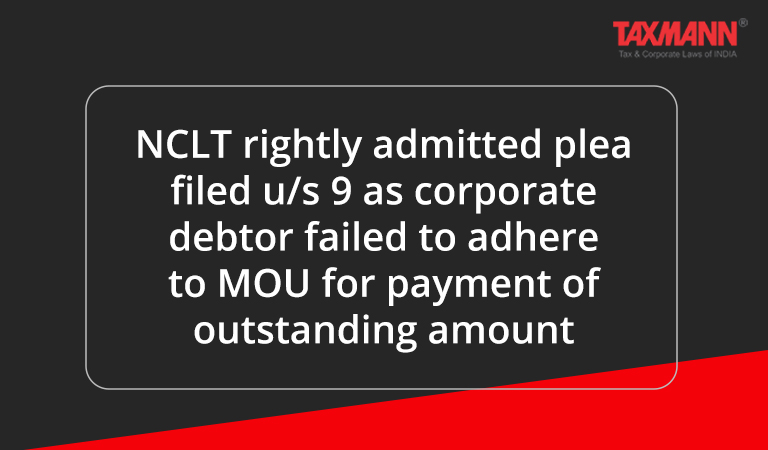NCLT rightly admitted plea filed u/s 9 as corporate debtor failed to adhere to MOU for payment of outstanding amount
- Blog|News|Insolvency and Bankruptcy Code|
- 2 Min Read
- By Taxmann
- |
- Last Updated on 7 December, 2022

Case Details: Palaparty Abhishek v. Binjusaria Ispat (P.) Ltd. - [2022] 145 taxmann.com 173 (NCLAT-Chennai)
Judiciary and Counsel Details
-
- Venugopal M., Judicial Member & Kanthi Narahari, Technical Member
- Virender Ganda, Sr. Counsel & Bhaskar, Adv. for the Appellant.
- Avinash Krishnan Ravi, Adv. for the Respondent.
Facts of the Case
In the instant case, the respondent raised invoices for the supply of goods, sold and delivered to the corporate debtor. An MoU was entered between the parties, and as per the MoU the corporate debtor/appellant agreed to repay the outstanding amount. However, the corporate debtor failed to adhere to the terms of MoU. Further the cheques issued by the corporate debtor were dishonoured.
Consequently, the respondent issued a demand notice and the corporate debtor, in reply to the notice stated that the MoU and the blank cheques were taken forcibly from the appellant. On default in making payment and dishonoured of cheques, the respondent filed a company petition under sections 433, 434 and 439 of the Companies Act, 1956 before the High Court for winding up of the corporate debtor.
However, the said application was transferred to the NCLT from the High Court. Thereafter, the respondent filed a fresh application under section 9 before NCLT for initiation of CIRP. The NCLT admitted the application on the grounds that the corporate debtor executed an MoU and cheques were given as part of the MoU were dishonoured by the corporate debtor, and that the corporate debtor had not made out any case with respect to the allegations that the MoU was taken under coercion and, therefore there was a debt on the part of the corporate debtor.
Subsequently on appeal, the appellant submitted that the corporate debtor never accepted the debt claimed by the respondent and that the MoU and blank cheques were obtained from the corporate debtor under coercion to use it against the corporate debtor.
The appellant further contended that the petition filed before the NCLT was time barred as per Notification dated 7-12-2016 issued by the Ministry of the Corporate Affairs and that the application had to be filed within 60 days and, therefore, the impugned order admitting the application filed by respondent was erroneous and the same was to be set aside.
NCLAT Held
The Hon’ble NCLAT held that there was no coercion as alleged by the corporate debtor and the corporate debtor failed to adhere to MoU and cheques issued were also dishonoured. Further, debt and default had been proved and the NCLT was correct in admitting application filed under section 9.
List of Cases Reviewed
-
- Order of NCLT – Chennai in CP(IB) No. 525/9/HDB/2019, dated 16-11-2021 (para 23 ) affirmed.
- Mobilox Innovations (P.) Ltd. v. Kirusa Software (P.) Ltd. [2017] 85 taxmann.com 292/144 SCL 37 (SC) (para 22) followed.
List of Cases Referred to
-
- Mobilox Innovations (P.) Ltd. v. Kirusa Software (P.) Ltd. [2017] 85 taxmann.com 292/144 SCL 37 (SC) (para 22).
Disclaimer: The content/information published on the website is only for general information of the user and shall not be construed as legal advice. While the Taxmann has exercised reasonable efforts to ensure the veracity of information/content published, Taxmann shall be under no liability in any manner whatsoever for incorrect information, if any.

Taxmann Publications has a dedicated in-house Research & Editorial Team. This team consists of a team of Chartered Accountants, Company Secretaries, and Lawyers. This team works under the guidance and supervision of editor-in-chief Mr Rakesh Bhargava.
The Research and Editorial Team is responsible for developing reliable and accurate content for the readers. The team follows the six-sigma approach to achieve the benchmark of zero error in its publications and research platforms. The team ensures that the following publication guidelines are thoroughly followed while developing the content:
- The statutory material is obtained only from the authorized and reliable sources
- All the latest developments in the judicial and legislative fields are covered
- Prepare the analytical write-ups on current, controversial, and important issues to help the readers to understand the concept and its implications
- Every content published by Taxmann is complete, accurate and lucid
- All evidence-based statements are supported with proper reference to Section, Circular No., Notification No. or citations
- The golden rules of grammar, style and consistency are thoroughly followed
- Font and size that’s easy to read and remain consistent across all imprint and digital publications are applied



 CA | CS | CMA
CA | CS | CMA
